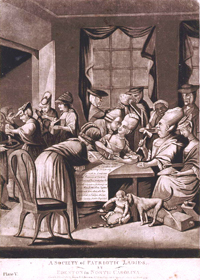| |
Introduction
In response to Parliamentary taxation of imported goods, including tea, Anglo-Americans launched a series of protests during the late 1760s and early 1770s. The most famous protest was the Boston Tea Party, at which men dressed as Indians and dumped hundreds of chests of tea into Boston Harbor. Other communities throughout the colonies staged various forms of protest, many involving women. In North Carolina, for example, fifty-one members of the Edenton Ladies' Patriotic Guild signed a pledge in support of colonial resistance. Women, however, were not supposed to join in political activities, so those who did were often subjected to ridicule by people opposed to the causes such women supported. The engraving below was produced by an English artist who most likely aimed at undermining the credibility of American protests by suggesting that women participating in them were hardly "ladies."
Questions to Consider
-
What does the cartoon suggest about women engaged in political acts?
-
What does the cartoon suggest were a "lady's" proper concerns?
-
If women became involved in politics, what would become of their households and their families?
-
According to the cartoonist, what did the events in Edenton imply about male colonists and about the future of colonial society?
Document

(click to enlarge)
Source:
"A society of patriotic ladies, at Edenton in North Carolina," printed for R. Sayer & J. Bennett, London, March 25, 1775. Washington, D. C., Prints and Photographs Division, Library of Congress.
Next >>>
<<< Return to Evidence
|